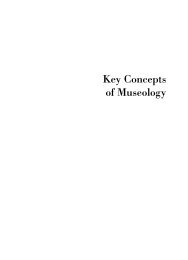ISS 25 (1995).pdf - The International Council of Museums
ISS 25 (1995).pdf - The International Council of Museums
ISS 25 (1995).pdf - The International Council of Museums
Create successful ePaper yourself
Turn your PDF publications into a flip-book with our unique Google optimized e-Paper software.
For museums this would mean -among others- exceeding the "ivory tower" mentality and<br />
the assumption that the expertise <strong>of</strong> museum scholars and pr<strong>of</strong>essionals is the only<br />
parameter to define what should be included in museums, or what the audiences should<br />
know; it would also demand the sharing <strong>of</strong> "power" with segments <strong>of</strong> a larger civic whole.<br />
<strong>Museums</strong>, indeed, have shown an increasing concern over their publics'expectations and<br />
needs 3 , being convinced that they cannot survive without public attention. Educational<br />
activities, <strong>of</strong>ten tailored to the publics' requirements, have been a paramount expression<br />
<strong>of</strong> this attitude <strong>of</strong> extending democratically the arm towards the surrounding<br />
consti tuencies.<br />
Presently, however, various segments <strong>of</strong> the public go further: they demand to affirm their<br />
point <strong>of</strong> view in the basic museum activities, raise questions about the treatment <strong>of</strong> topics<br />
worked out by museums, require that the exhibitions reflect contemporary issues and<br />
present- day realities, among which the articulation <strong>of</strong> identity holds a key position.<br />
It seems that the mosaic <strong>of</strong> communities which constitute a museums' public, seeks to<br />
influence and - to an extent- to control the way museums act or analyze and represent<br />
facts 4 .<br />
Obviously it is the changes in the society outside the museums that provide the material<br />
for such requests and feed the battle for equal opportunity in the cultural field .<br />
Forcommunities it seems that this kind <strong>of</strong> stuggle is fundamental for their existence and<br />
acknowledgment by the museum <strong>of</strong> their opinions contributes to the process <strong>of</strong> according<br />
social space to them.<br />
At the same time, this very fact demonstrates the museuums' hierarchical position among<br />
other social institutions and apparatuses which provide the contexts within which people<br />
work out essential intellectual elements <strong>of</strong> living like beliefs, ideas and values.<br />
22
















